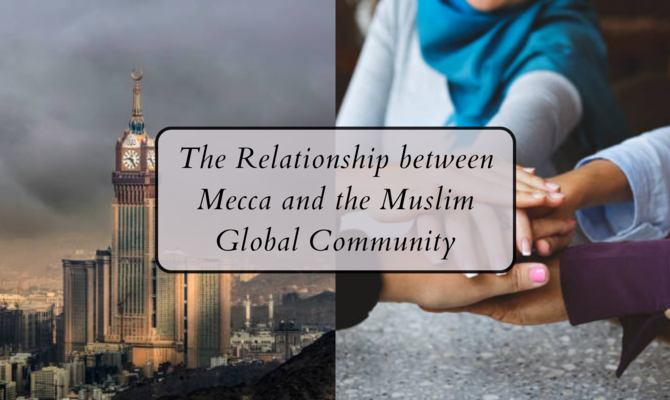Mecca, the holiest city in Islam, holds a special place in the hearts and minds of Muslims around the world. The city, which is home to the Grand Mosque and the Kaaba, is the birthplace of the Prophet Muhammad (PBUH). It is the site of the annual Hajj pilgrimage, which is the world’s largest religious gathering. The relationship between Mecca and the global Muslim community is a unique and complex one. Numerous historical, religious, and cultural factors shape this relationship. For more information, read the comprehensive explanation in this article: “The Relationship between Mecca and the Muslim Global Community.”
Mecca is a remarkable city in the Hejaz region of the Saudi Kingdom. It is home to the historical Masjid al-Haram, which is the most popular tourist place in Saudi Arabia. Many Muslims visit this wonderful city to complete their religious rituals by booking Umrah Packages.
Factors to Shaping the Relationship between Mecca and the Muslim Global Community
Numerous religious, cultural, and historical factors shape the relationship between Mecca and Muslims across the entire world. These factors include the following:
- Islamic History and Theology
- The Hajj Pilgrimage
- Cultural and social values of Muslims
- Islamic scholarship and learning
- Social, political, and economic issues
Islamic History and Theology
Mecca’s central role in Islamic theology and history is the relationship between the city and the global Muslim community. It is one of the key factors that shaped this relationship. According to Islamic tradition, Mecca is the site where the Prophet Muhammad (PBUH) first received revelations from Allah. The Holy Quran was eventually assembled from these revelations. The city is also the birthplace of the Islamic faith, which emerged in the Arabian Peninsula in the 7th century. Therefore, Mecca is the spiritual and cultural heart of Islam. Muslims around the world look to the city as a source of guidance and inspiration.
The Hajj Pilgrimage
Another factor that has shaped the relationship between Mecca and the global Muslim community is the annual Hajj pilgrimage. The Hajj, which is one of the five pillars of Islam, involves a series of rituals. Millions of Muslims carry out these religious ceremonies in and around Mecca over several days. For Muslims who are capable of making the journey both physically and financially, the pilgrimage is obligatory. A report claims that almost two million pilgrims make the pilgrimage to Saudi Arabia each year. The Hajj is a powerful symbol of unity, brotherhood, and solidarity among Muslims. It serves to connect Muslims from all over the world to the spiritual and cultural heritage of Mecca.
Mecca also plays a significant role in shaping the cultural and social norms of the global Muslim community. The city is well-known for its strict adherence to Islamic law and tradition. This strict adherence is reflected in the dress, behaviour, and customs of the city’s inhabitants. For example, women in Mecca must wear the hijab, a headscarf that covers the hair and neck. This attire is a sign of modesty and piety. Similarly, the consumption of alcohol and the public display of affection is strictly prohibited in Mecca. It reflects the city’s commitment to upholding Islamic values and principles.
Islamic scholarship and learning
Mecca also serves as a hub for Islamic scholarship and learning, with numerous Islamic universities and research centres. These institutions lie in and around the city. These institutions are dedicated to studying and interpreting Islamic scripture and tradition. Additionally, these universities play a critical role in shaping the religious and intellectual discourse of the global Muslim community. Many of the scholars and thinkers have had a profound impact on Islamic theology and philosophy, including Imam Malik. Imam Malik has studied or taught in Mecca, underscoring the city’s enduring influence on Islamic thought and practice.
Social, political, and economic issues
Mecca’s influence on the Muslim community is not limited to religious matters. The city also has a significant impact on politics, economics, and social issues. Mecca’s oil wealth, for example, has helped to fuel the growth of the Saudi Arabian economy. This economy is one of the largest and most dynamic in the Muslim world. Mecca’s political and cultural influence is also felt throughout the region. With the help of this influence, the Saudi government plays an important role in shaping the political and social landscape of the Middle East.
Mecca and Challenges
Despite its importance, however, Mecca is not without controversy. In recent years, there has been growing concern among some Muslims about the commercialization and commodification of the Hajj pilgrimage. People argue that the emphasis on luxury accommodations and high-end amenities has detracted from the spiritual experience of the pilgrimage. There have also been concerns about the role of the Saudi government in controlling access to Mecca and its holy sites. Some Muslims call for greater transparency and accountability in the management of these significant institutions.
Conclusion
To summarize, Mecca holds unparalleled significance in the Muslim global community. It is the birthplace of Islam and the location of the Kaaba. The Holy Kaaba serves as the focal point for the world’s Muslims during their pilgrimage known as the Hajj. Mecca’s significance extends beyond its physical boundaries and has become a symbol of Muslim unity and brotherhood. The annual Hajj pilgrimage brings millions of Muslims from all corners of the world together in a spiritual journey. This pilgrimage reinforces their faith and strengthens their connection to each other. Additionally, Mecca’s history and religious significance have contributed to the growth and development of Islamic thought and culture. Therefore, Muslims visit this city to carry out their religious duties by booking Umrah Packages 2023. In this way, the relationship between Mecca and the Muslim global community is an inseparable one that is deeply rooted in faith, tradition, and history.





